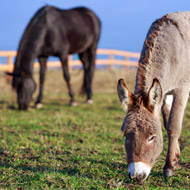Donkeys need more protection from winter than horses, study finds

Donkeys' coats are much lighter, shorter and thinner than those of horses and mules in winter.
Donkeys are less able than horses to adapt to colder, wetter climates, according to new research. As such, they need more protection during the winter months to meet their welfare needs.
The finding, published in the Equine Veterinary Journal, is the result of a study of the extent to which donkeys need protection from the elements.
In the study, scientists took measurements of the insulation properties of hair samples (weight, length and thickness) and found that donkeys’ coats do not significantly change over the seasons.
Their study revealed that donkeys’ coats are much lighter, shorter and thinner than those of horses and mules in winter. In contrast, the coats of horses and ponies changed significantly between seasons, growing much thicker in winter.
The study was led by The Donkey Sanctuary in collaboration with animal behaviour and cognition specialists at the Universities of Portsmouth and Canterbury Christ Church.
Dr Faith Burden from The Donkey Sanctuary said: “For many years it has been the ‘common sense’ advice given by The Donkey Sanctuary to ensure that donkeys and mules are given the right protection from our cold winters.
“This study now provides us with scientific evidence to show why the welfare needs of donkeys and mules differ slightly to those of horses and ponies, and how we can act to give them better protection from the elements.”



 The latest
The latest